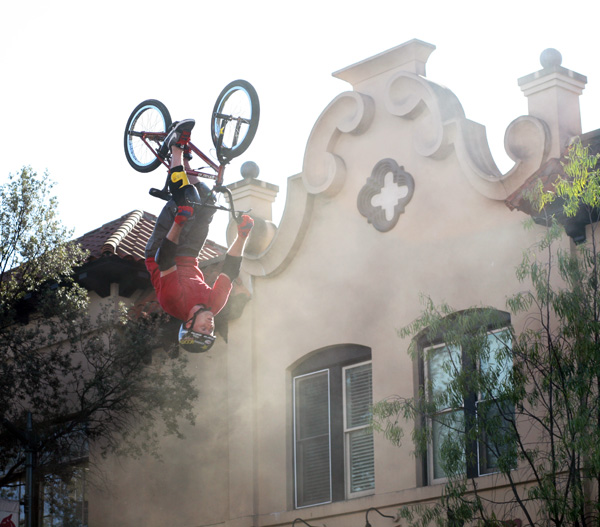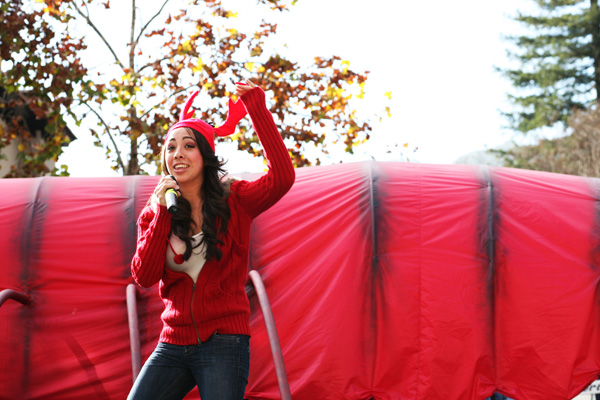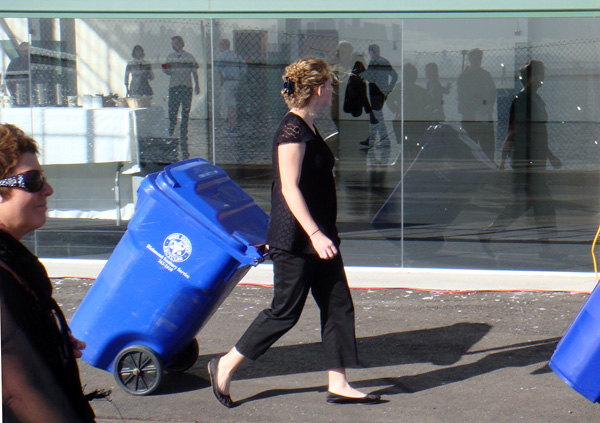Today’s text is from my memoir-in-progress, Nested Scrolls, and many of the photos are from the Los Gatos Christmas parade.
For the years 1990-2001, my novel Software was under option to a series of film companies, ending up at Phoenix Pictures. Every year someone would renew the option, and I’d get a few thousand more bucks. It was an exciting run, with dozens of ups and downs, and I went to a bunch of Hollywood meetings.
I took Rudy Jr. down there with me one time, to see Scott Billups, who was for a time slated to direct the film. Scott kept telling us about a helicopter skiing trip he’d taken, going on and on about the “long lines of powder,” which seemed like a bad sign. He had a connection with Mike Medavoy, the studio head at Phoenix Pictures.

“Mike’s got a new wife, and she’s running him ragged,” Billups told us.
“Is she beautiful?” I asked.
“Whatever she didn’t have, Mike bought her,” said Billups.
Medavoy wasn’t liking the script that Billups’s writer had come up with, so Phoenix hired the screenwriters from Toy Story, and gave them strict instructions not to read my book, but to work only from the existing scripts—there were four prior scripts by now, one of them by my cyberpunk friend John Shirley.

The fifth script was horrible, and they kept getting worse—soon we were up to version eight. By now Billups was being edged out, but Medavoy stayed active. I went down for another meeting and everyone was really encouraging.
One of the assistant producers and I went to strip club after that meeting. Sylvia couldn’t believe it, me in a strip club with my producer.
“What a sleaze-bag that guy must be!”
Actually, if the truth be told, it was my idea to go see the strippers. It seemed like the right thing to do. And the club was right next to the airport.

The scripts kept getting worse—we were up to version ten before long. The film agent I was using then, Steve Freedman, told me that by now Phoenix had spent over a million dollars on test shots and discarded screenplays. I was alarmed that they’d thrown out so much money on such shit. But Steve said it was all good.
“The million dollars makes Medavoy pregnant. If he tries to back out, I say, ‘No, you’re pregnant, you’ve got to make the film.’”
I had one last meeting with Mike Medavoy. He finally wanted my advice on how to doctor the script. They flew me to LA first class, and a limo picked me up at the airport. Like so many people in LA, the driver was talking about the Business, and she was happy to hear I was going to a script meeting.

Outside the Phoenix building, I met Steve Freedman. He wasn’t a big-time agent by any means. I’d hired him more or less at random. He looked more feral and weasel-like than I’d remembered from our earlier meetings. He was wearing a Mexican wedding shirt with the tail hanging out. I was wearing black silk pants, black silk sport shirt, black silk jacket and wraparound black shades. Mr. Cyberpunk.
Steve had been somewhat manic during our recent phone conversations, so I warned him not to be throwing in extra story ideas of his own. He agreed readily, and claimed that at the end of the meeting he’d corner Medavoy and get us our final deal.
We cooled our heels in a side room for a half hour, chatting with an assistant producer. Medavoy was stuck in a meeting, running a little late.

“So who’s he meeting with?” I asked the assistant producer.
“Arnold Schwarzenegger.”
The Terminator! Right here! Arnold was starring in film called The Sixth Day that Phoenix was to release in a few months. Soon Arnold walked by with his body guard, coming out of his meeting. He was short, as the big stars always are. He glanced over, checking us out.
And now it was our turn with Mike Medavoy. It was him, me, Steve, and a couple of assistant producer guys. One of these two appeared to be wearing foundation makeup and lipstick. Or maybe he was made of plastic. My focus was on Medavoy. He was an Irish-looking guy, in preppy clothes.

He said he was worried about the project, and that he was embarrassed to have spent over a million dollars. He longed to hear a decent plot line, clearly broken into three acts.
I’d been preparing for this. By now I understood the Hollywood obsession with three acts. I began pitching my version, talking for five or ten minutes, but I went too slow.
Medavoy interrupted, weary and impatient. “Tell me the second act before I have to kill myself.”
Flop sweat. I rushed through the second act, but I only got in a few words about my third act before Medavoy cut me off.
“Hard to make all that work,” he said, dismissing my ideas.

And then he told how he envisioned the movie. A thriller. Lots of chase scenes. An epic battle for the spaceport, with American soldiers against robots. A general and a colonel for the lead characters.
“Big base on the Moon,” continued Medavoy. “It’s, I dunno, why not the Octagon?”
I was flabbergasted, horrified, uncomprehending. “Octagon?”
“Like the Pentagon where the military is. I was just there on a tour last week. They have two war rooms now. It’s great.”
I glanced over at Steve Freedman. He was grinning ear to ear with his head nodding Yes like a plaster dog with its head on a spring. He’d never actually seen Medavoy before. He was in paradise just sitting at this meeting. There was no way he was going to corner this studio head and tell him he was pregnant.

And then Medavoy’s underlings were hustling us out. Steve and I walked across the street and had lunch in the SONY cafeteria, a couple of Hollywood losers, cheering ourselves up with thick sandwiches and staircase wit. I started rapping about pumping up the third act with a flying robot mosquito loaded with a mind-virus to sting the President. I picked up the frilly toothpick from my sandwich and zoomed it around, menacing Steve with it, and he was laughing. He told me his father had been a Hollywood agent too.
The Software project was dead. A couple of months later, Phoenix Pictures sent the new Schwarzenegger movie, The Sixth Day, into the theaters.

This film carries strong echoes of my Ware books. The central idea in The Sixth Day is to record someone’s brain software and then to load that personality onto a tank-grown clone of that person.
These happen to be a pair of ideas that appeared, arguably for the very first time, in my novels Software and Wetware. It took me some years of thought and effort to come up with these twists. They hadn’t been obvious or “in the air.” But by now cyberpunk was old news, and my books had been kicking around the Phoenix offices for a decade.
The villain in The Sixth Day wears horn-rimmed glasses just like mine and is called “Drucker.” Might the film-makers have been driven by a Raskolnikov-like compulsion to confess their crime?
“Yes, I killed the old woman with an axe! Yes, I stole Dr. Rucker’s ideas!”

So did I sue? Well, Mom always said it’s tacky to sue. I’m a writer, not a lawyer. And, after all, I had picked up a fair amount of money from Hollywood by repeatedly rolling over those option agreements for ten years. Why bite a hand that might feed me again?
[For still more on this, see my earlier blog entry on Remembering Software in Hollywood.]









December 9th, 2008 at 11:44 pm
A few nights ago I was in a bar and “The Sixth Day” was on TV. I didn’t even think to link “Drucker” with “Rucker” but now it’s too obvious!
December 10th, 2008 at 4:58 am
Such a shame Software never got made into a movie. It has an entry in the IMDb. with “Production Design by Syd Mead”, well they got that bit of planning right.
But it is rare that a great book gets made into an even better than the book movie. The only movie I can think of which are much better than the books are ‘Forrest Gump’ and ‘Fight Club’. And the somewhat obscure ‘Ministry of Fear’ by Fritz Lang (from the book by Graeme Greene).
December 10th, 2008 at 7:30 pm
The British mystery writer P.D. James says that few things delight her more than being paid for the film/TV rights to her books and then not having to see the result on the screen.
December 11th, 2008 at 10:33 am
screw hollywood. Make people read. But yeah, keep taking the money 🙂
December 11th, 2008 at 11:37 am
Super interesting! My favourite character is the weasel-y agent.
December 11th, 2008 at 11:50 am
There’s nothing that continues to do more damage to Hollywood cinema than the outdated three-act obsession and general preoccupation with unnecessarily restrictive narrative forms and clichés. It keeps popular cinema from evolving. Science-fiction in particular seems to be the worst victim; perhaps in some way, Hollywood producers realize the genre’s limitless potential for imaginative experimentation, and feel the need to continually dumb it down with tired conventions in order to make it more “palatable.”
Groundbreaking ideas demand groundbreaking execution. Here’s hoping your story finds an appropriate visual expression someday, Rudy. In the meantime, I will definitely be picking up a copy of the book.
December 11th, 2008 at 12:06 pm
Studio producers think they should set the creative direction and plot of films?
No surprise at all that so many movies fail so miserably. If the contract’s still around on Postsingular, here’s hoping you can get it to an indie filmmaker!
December 11th, 2008 at 12:23 pm
It sounds like you might hit it off with Robert Rodriguez, screw the outdated hollywood crowd.
December 11th, 2008 at 12:47 pm
When are you going to make the movie about the robot mosquito?
December 11th, 2008 at 1:08 pm
Did the studio execs discuss adding a talking pie and time travel? I think every movie needs more of that; along with robot mosquitos, of course.
December 11th, 2008 at 1:51 pm
“…in The Sixth Day is to record someone’s brain software and then to load that personality onto a tank-grown clone of that person.
These happen to be a pair of ideas that appeared, arguably for the very first time, in my novels Software and Wetware.”
A combination of ideas I’m sure I encountered even earlier, but surely John Varley pipped you to that particular post in the seventies?
December 11th, 2008 at 2:19 pm
OT – I read White Light in high school (1989) and became a huge fan of yours. I read all the -ware books about every four or five years. It seems so odd that I can just come to your blog and post a comment of appreciation. I guess the future really is now!
December 12th, 2008 at 7:39 am
Dr. Rucker,
Ditto to the post about acknowledging a writer and series I have admired for years. Also ditto to keep taking the money, but if possible, try to maintain some shadow of creative control. I would hate to see any of your exemplary work mutilated like that travesty of Zelazny’s classic Damnation Alley some years ago.
December 12th, 2008 at 4:23 pm
Jay Hurst, I did say I was ARGUABLY the first to write about mind upload and a new wetware body, at least in a certain sense. I’ve discussed this in the comments before, see this thread.
December 12th, 2008 at 6:01 pm
I’m caught between wishing Rudy Rucker mega-success and being glad that a terrible Meduhvoy (sic) version of Software was never made.
December 15th, 2008 at 1:37 pm
Did you ever visit this site?
http://www.braintec.info
I was very fond of it several years ago and it was just an hour fo googling to find it again.
greetings
Kehrtraud
December 16th, 2008 at 8:38 am
Rudy, maybe you should head back to Japan and talk to the anime studios? SOFTWARE would work pretty well as an animation.
December 17th, 2008 at 9:35 am
Rudy,
So nice to catch up with you on the web. (Haven’t seen you for over 15 years, when Sylvia and you let Philip K. and rack down in sleeping bags on your living room floor when I was doing that magazine article on you.) I just discovered your blog this morning, through a piece Boing Boing did on our paintings on Lulu, et al. (Love the paintings.) Re: the funny piece on “Software” being in Hollywood. I have an expression — at my ad agency, and in dealing with people on my sideline art projects such as books, music and little films. It goes SMN-ROTC (pronounced smin-rotsey). It means “spell my name right on the checks.” Whenever anyone goes to put their paw prints on your creations, always take the money and avoid contact with the results, or never take the money and remain “pure.” It is a virtual impossibility that a good book (and the Ware series is classic) will ever be made into a decent film. And even if it were possible, Stanley Kubrick (as usual) got it right apropos of such “translations.” He said (to paraphrase) “a book is a book, and a film is a film; they have nothing in common and should never be compared.” That is true, and must be, since they are separate art forms. And Kubrick almost exclusively worked from source material; he said, in effect, “Why would I spend my time creating characters and plots for films when so many good ones have already been created in books?” Of course, then he proceeded to spend five years adapting the novel into a screenplay with any one of a number of writers (go figure). And, of course, Kubrick was a genius, and for the most part only made excellent films. Usually, when a film company goes to adapt a novel, the results are dreadful. But even when a good movie (of the same name, or a new name) is sprung from the raw material of a good book, I never weigh one against the other. I count myself lucky on those rare occasions when I am able to read a good book, and then see a good film, both of which share some similarity. Great to find you on the web. Cheers, Greg
December 27th, 2008 at 11:09 am
Rudy, great entry. I’ve dealt with Hollywood, too, as a storyboard artist and that experience, a little over 6 months, left me with a complete distaste for dealing with The Business in any way but consuming the final product. Still, the fact that your ideas were of interest long enough to warrant spending a good deal of money is a fun opportunity that few people get to experience. I’m really enjoying the posts and looking forward to the next.
April 18th, 2009 at 6:16 pm
This post made me really laugh. I am a film producer myself and used yo work for someone you mentioned in one of your posts. Yep….sounds like him. What’s you email address?
April 18th, 2009 at 8:23 pm
Bob, to email me, go to the “Email Rudy” page
http://www.rudyrucker.com/emailrudyrucker.htm
September 8th, 2012 at 5:32 pm
Well, i didn’t see “The Sixth Day” but I finished “Software” today.
Thanks for sharing the Tetralogy with us Rudy, If it will ever be translated into german I will buy it.
July 10th, 2013 at 2:01 pm
Rudy,
I am the guy who gave Director Scott Billups the “Live Robots” book and said it would be an epic trilogy.
I am so sorry it didn’t work out. I went to every pre-production meeting and tried to keep things on track but it was just too impossible with so many cooks and so many new and bad ideas popping up. I really hope it happens someday soon.
July 10th, 2013 at 2:46 pm
Shawn, thanks for checking in. I remember hearing about you.
I used to be sure the WARES would lead to some movies fairly soon, but now I think the wheel of history will need to turn a few more clicks before the WARE movie project cycles back into the Hollywood hive mind. But I do still think it will, one fine day, although possibly after I’m no longer here in meatspace with y’all. I don’t worry about it anymore.
By the way, there are four WARE novels now, rather than the three in the Live Robots antho, check out my WARE TETRALOGY, available in paperback, commercial ebook, and some free CC editions. See
http://www.rudyrucker.com/wares/
I’ve lately been toying with the idea of writing a fifth WARE, maybe starting work on it in summer or fall of 2014. We’ll see…